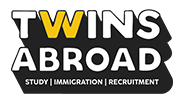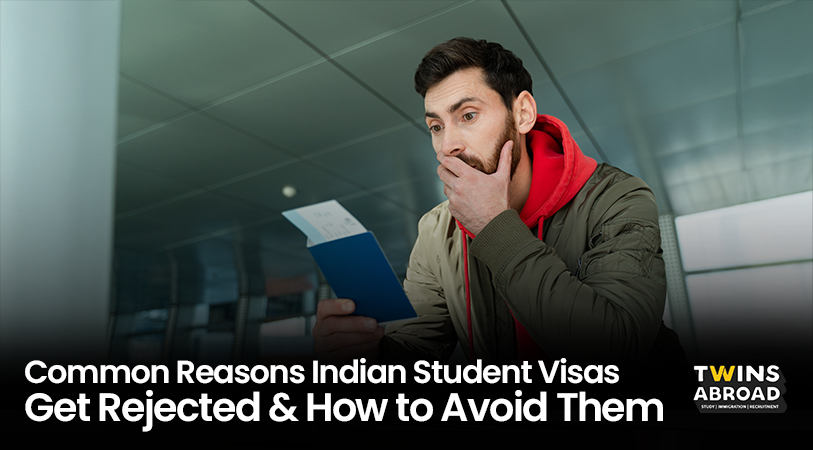Common Reasons Indian Student Visas Get Rejected & How to Avoid Them
Studying abroad is a dream that countless Indian students nurture. Every year, thousands apply for student visas to countries like the United States, Canada, the United Kingdom, Australia, and Germany. However, not every application turns into a success story. Visa rejections can be heartbreaking, especially after investing considerable time, money, and effort. Understanding why visas are denied and learning how to avoid these pitfalls can significantly improve your chances of approval.
In this blog, we will explore the most common reasons for student visa rejections and guide you on how to overcome them with careful planning and preparation.
Lack of Proper Financial Proof
One of the most critical aspects of any student visa application is proving that you have sufficient financial resources to cover tuition fees, living expenses, and other costs associated with studying abroad. Immigration officers need to be convinced that you won’t become a financial burden on their country.
If you fail to provide authentic, verifiable, and adequate financial documents, your visa application can be swiftly denied. Sometimes, inconsistencies between the tuition fees mentioned in your offer letter and your financial proof can raise red flags.
How to Avoid It
Ensure that your bank statements, loan approvals, scholarship letters, and financial affidavits are clear, genuine, and correspond with the costs outlined by your university. It’s important to show not just enough for the first year, but ideally for the entire duration of your study program.
Weak Ties to Home Country
Visa officers often look for evidence that students have strong reasons to return home after completing their studies. If they sense that a student may overstay their visa or try to immigrate illegally, they are likely to deny the application.
Lack of family ties, property ownership, career prospects in India, or any hint that you are primarily seeking immigration (not education) can lead to rejection.
How to Avoid It:
Clearly demonstrate your intent to return by highlighting your family ties, career opportunities in India, or business interests. You can include job offers, family-owned businesses, or even career growth plans that are contingent on your return to India.
Incomplete or Inconsistent Documentation
Missing documents or discrepancies between different sections of your application can confuse or worry visa officers. Minor errors such as wrong dates, misspelled names, or incomplete forms can cause delays or outright rejections.
Consistency across your passport, admission letters, SOP (Statement of Purpose), bank documents, and academic certificates is crucial.
How to Avoid It:
Double-check every document you submit. Cross-verify that your names, dates of birth, program names, and university details match exactly across all paperwork. It’s a good idea to get your application reviewed by an education consultant or legal expert before submitting it.
Poor Statement of Purpose (SOP)
An SOP is not just a formality. It is your voice in the visa process, explaining why you chose the particular course, university, and country. A generic, weak, plagiarized, or poorly written SOP can make the visa officer doubt your seriousness about studying.
Often, visa officers look for clarity, logical reasoning, and honesty in your SOP. If your career goals appear vague or disconnected from your chosen course, it can harm your chances.
How to Avoid It:
Take your SOP seriously. Tailor it specifically for your visa application, making sure it addresses your educational background, career goals, course relevance, and reasons for choosing the country and university. Keep it genuine, focused, and free of grammar errors.
Poor Performance in Visa Interviews
Many countries, especially the United States, conduct personal interviews as part of the visa process. A nervous, unprepared, or inconsistent interview can easily lead to a rejection.
If you contradict your application, hesitate to answer basic questions, or show a lack of knowledge about your chosen course or university, the officer may think you are not a genuine student.
How to Avoid It:
Practice possible visa interview questions with a friend, mentor, or counselor. Be confident but respectful. Make sure your answers are consistent with your application and documents. Stay calm even if you feel nervous.
Choosing a Course Unrelated to Previous Education
If there’s no logical academic progression from your previous studies to the course you want to pursue abroad, it can create doubts about your intentions. For example, if a mechanical engineering graduate suddenly applies for a culinary course without a solid explanation, visa officers may assume you are using education as a pretext to migrate.
How to Avoid It:
Choose a course that aligns with your past education or work experience, or provide a compelling and logical reason for the shift. You could highlight a career change, passion for a field, or a business plan that justifies the new course.
Inadequate Language Proficiency
Countries like Canada, Australia, and the UK require proof of English language proficiency (IELTS, TOEFL, PTE scores). If your scores are below the required standard, or if your visa interview shows poor communication skills, your visa may be denied.
How to Avoid It:
Take your language tests seriously. Aim to score higher than the minimum required. If you feel unsure about your speaking abilities, practice English conversation daily, watch English news, or join a spoken English course before your interview.
Suspicious or Fraudulent Documents
Unfortunately, some students fall into the trap of using fake admission letters, bank statements, or forged certificates. Immigration departments have highly advanced verification processes, and any hint of forgery leads to immediate rejection, blacklisting, and possible legal action.
How to Avoid It:
Always use authentic documents. Trustworthy admission consultants and certified legal advisors can help you process your application properly. Never be tempted by shortcuts that promise “guaranteed visas.”
Late Application or Insufficient Time for Processing
Applying too close to the academic intake can cause problems. Visa processing times vary by country and season, and last-minute applications may not leave room for corrections or additional document requests.
How to Avoid It:
Start your visa application process at least six months before your course start date. Stay updated about processing times and deadlines set by both the university and embassy.
Lack of Clarity About Career Plans
If your application and interview show uncertainty about your career goals, visa officers might think you are unsure about your decision to study abroad. Ambiguity raises doubts about your genuine intent to study.
How to Avoid It:
Prepare a clear and realistic career plan. Be ready to discuss how the course will enhance your professional prospects, whether it’s in India or globally.
Tips to Strengthen Your Student Visa Application
Having understood the reasons for rejections, here are a few proactive strategies to boost your application:
Start Early and Plan Carefully
A well-prepared application takes months. Give yourself enough time to gather documents, take language tests, apply to universities, and prepare for interviews.
Be Transparent and Honest
Always provide true information, even if some parts of your story seem weak. It’s better to explain gaps or low scores honestly than to fabricate stories.
Consult Reliable Experts
Seek help from authorized immigration consultants or university representatives. They can guide you about document requirements, country-specific rules, and best practices.
Improve Your Profile
Focus on academic achievements, extracurricular involvement, internships, and relevant work experience. A strong profile not only impresses universities but also immigration officers.
Conclusion
A visa rejection is not the end of the road, but it’s a setback best avoided through diligent preparation. Understanding the common reasons for student visa denials helps you take preventive measures and submit a strong, convincing application.
Remember, a successful visa application tells a clear story: you are a serious student with the academic capability, financial resources, language proficiency, and honest intentions to study abroad and return home after completing your education.
By paying attention to these critical areas, Indian students can dramatically improve their chances of studying in top destinations worldwide and making their global dreams come true.


Leave a Reply